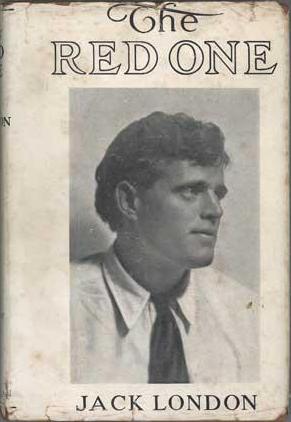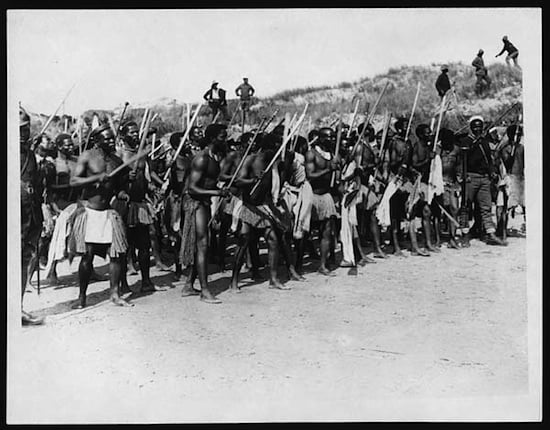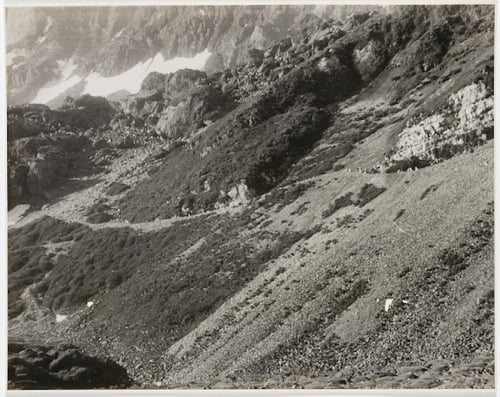The Red One (1)
By:
October 18, 2012

HILOBROW is pleased to present the first installment of our serialization of Jack London’s Jungian science fiction story “The Red One.” We have also serialized London’s science fiction novel The Scarlet Plague, and published it in a gorgeous paperback edition with a new introduction by Matthew Battles.
Lured into the uncharted jungle of Guadalcanal by an otherworldly noise, the naturalist Bassett is attacked by cannibalistic bushmen who worship “The Red One” (or “The Star-Born”), a deity which turns out to hail from extraterrestrial parts. First published posthumously, in the October 1918 issue of Cosmopolitan, the story is now in public domain.
SUBSCRIBE to HILOBROW’s serialized fiction via RSS.
ALL EXCERPTS: 1 | 2 | 3 | 4 | 5
There it was! The abrupt liberation of sound! As he timed it with his watch, Bassett likened it to the trump of an archangel. Walls of cities, he meditated, might well fall down before so vast and compelling a summons. For the thousandth time vainly he tried to analyse the tone-quality of that enormous peal that dominated the land far into the strong-holds of the surrounding tribes. The mountain gorge which was its source rang to the rising tide of it until it brimmed over and flooded earth and sky and air. With the wantonness of a sick man’s fancy, he likened it to the mighty cry of some Titan of the Elder World vexed with misery or wrath. Higher and higher it arose, challenging and demanding in such profounds of volume that it seemed intended for ears beyond the narrow confines of the solar system. There was in it, too, the clamour of protest in that there were no ears to hear and comprehend its utterance.
— Such the sick man’s fancy. Still he strove to analyse the sound. Sonorous as thunder was it, mellow as a golden bell, thin and sweet as a thrummed taut cord of silver — no; it was none of these, nor a blend of these. There were no words nor semblances in his vocabulary and experience with which to describe the totality of that sound.

Time passed. Minutes merged into quarters of hours, and quarters of hours into half-hours, and still the sound persisted, ever changing from its initial vocal impulse yet never receiving fresh impulse — fading, dimming, dying as enormously as it had sprung into being. It became a confusion of troubled mutterings and babblings and colossal whisperings. Slowly it withdrew, sob by sob, into whatever great bosom had birthed it, until it whimpered deadly whispers of wrath and as equally seductive whispers of delight, striving still to be heard, to convey some cosmic secret, some understanding of infinite import and value. It dwindled to a ghost of sound that had lost its menace and promise, and became a thing that pulsed on in the sick man’s consciousness for minutes after it had ceased. When he could hear it no longer, Bassett glanced at his watch. An hour had elapsed ere that archangel’s trump had subsided into tonal nothingness.
Was this, then, his dark tower? — Bassett pondered, remembering his Browning and gazing at his skeleton-like and fever-wasted hands. And the fancy made him smile — of Childe Roland bearing a slug-horn to his lips with an arm as feeble as his was. Was it months, or years, he asked himself, since he first heard that mysterious call on the beach at Ringmanu? To save himself he could not tell. The long sickness had been most long. In conscious count of time he knew of months, many of them; but he had no way of estimating the long intervals of delirium and stupor. And how fared Captain Bateman of the blackbirder Nari? he wondered; and had Captain Bateman’s drunken mate died of delirium tremens yet?
From which vain speculations, Bassett turned idly to review all that had occurred since that day on the beach of Ringmanu when he first heard the sound and plunged into the jungle after it. Sagawa had protested. He could see him yet, his queer little monkeyish face eloquent with fear, his back burdened with specimen cases, in his hands Bassett’s butterfly net and naturalist’s shot-gun, as he quavered, in Bêche-de-mer English: “Me fella too much fright along bush. Bad fella boy, too much stop’m along bush.”
Bassett smiled sadly at the recollection. The little New Hanover boy had been frightened, but had proved faithful, following him without hesitancy into the bush in the quest after the source of the wonderful sound. No fire-hollowed tree-trunk, that, throbbing war through the jungle depths, had been Bassett’s conclusion. Erroneous had been his next conclusion, namely, that the source or cause could not be more distant than an hour’s walk, and that he would easily be back by mid-afternoon to be picked up by the Nari’s whale-boat.

“That big fella noise no good, all the same devil-devil,” Sagawa had adjudged. And Sagawa had been right. Had he not had his head hacked off within the day? Bassett shuddered. Without doubt Sagawa had been eaten as well by the “bad fella boys too much” that stopped along the bush. He could see him, as he had last seen him, stripped of the shot-gun and all the naturalist’s gear of his master, lying on the narrow trail where he had been decapitated barely the moment before. Yes, within a minute the thing had happened. Within a minute, looking back, Bassett had seen him trudging patiently along under his burdens. Then Bassett’s own trouble had come upon him. He looked at the cruelly healed stumps of the first and second fingers of his left hand, then rubbed them softly into the indentation in the back of his skull. Quick as had been the flash of the long handled tomahawk, he had been quick enough to duck away his head and partially to deflect the stroke with his up-flung hand. Two fingers and a hasty scalp-wound had been the price he paid for his life. With one barrel of his ten-gauge shot-gun he had blown the life out of the bushman who had so nearly got him; with the other barrel he had peppered the bushmen bending over Sagawa, and had the pleasure of knowing that the major portion of the charge had gone into the one who leaped away with Sagawa’s head. Everything had occurred in a flash. Only himself, the slain bushman, and what remained of Sagawa, were in the narrow, wild-pig run of a path. From the dark jungle on either side came no rustle of movement or sound of life. And he had suffered distinct and dreadful shock. For the first time in his life he had killed a human being, and he knew nausea as he contemplated the mess of his handiwork.
Then had begun the chase. He retreated up the pig-run before his hunters, who were between him and the beach. How many there were, he could not guess. There might have been one, or a hundred, for aught he saw of them. That some of them took to the trees and travelled along through the jungle roof he was certain; but at the most he never glimpsed more than an occasional flitting of shadows. No bow-strings twanged that he could hear; but every little while, whence discharged he knew not, tiny arrows whispered past him or struck tree-boles and fluttered to the ground beside him. They were bone-tipped and feather shafted, and the feathers, torn from the breasts of humming-birds, iridesced like jewels.
Once — and now, after the long lapse of time, he chuckled gleefully at the recollection — he had detected a shadow above him that came to instant rest as he turned his gaze upward. He could make out nothing, but, deciding to chance it, had fired at it a heavy charge of number five shot. Squalling like an infuriated cat, the shadow crashed down through tree-ferns and orchids and thudded upon the earth at his feet, and, still squalling its rage and pain, had sunk its human teeth into the ankle of his stout tramping boot. He, on the other hand, was not idle, and with his free foot had done what reduced the squalling to silence. So inured to savagery has Bassett since become, that he chuckled again with the glee of the recollection.
What a night had followed! Small wonder that he had accumulated such a virulence and variety of fevers, he thought, as he recalled that sleepless night of torment, when the throb of his wounds was as nothing compared with the myriad stings of the mosquitoes. There had been no escaping them, and he had not dared to light a fire. They had literally pumped his body full of poison, so that, with the coming of day, eyes swollen almost shut, he had stumbled blindly on, not caring much when his head should be hacked off and his carcass started on the way of Sagawa’s to the cooking fire. Twenty-four hours had made a wreck of him — of mind as well as body. He had scarcely retained his wits at all, so maddened was he by the tremendous inoculation of poison he had received. Several times he fired his shot-gun with effect into the shadows that dogged him. Stinging day insects and gnats added to his torment, while his bloody wounds attracted hosts of loathsome flies that clung sluggishly to his flesh and had to be brushed off and crushed off.

Once, in that day, he heard again the wonderful sound, seemingly more distant, but rising imperiously above the nearer war-drums in the bush. Right there was where he had made his mistake. Thinking that he had passed beyond it and that, therefore, it was between him and the beach of Ringmanu, he had worked back toward it when in reality he was penetrating deeper and deeper into the mysterious heart of the unexplored island. That night, crawling in among the twisted roots of a banyan tree, he had slept from exhaustion while the mosquitoes had had their will of him.
Followed days and nights that were vague as nightmares in his memory. One clear vision he remembered was of suddenly finding himself in the midst of a bush village and watching the old men and children fleeing into the jungle. All had fled but one. From close at hand and above him, a whimpering as of some animal in pain and terror had startled him. And looking up he had seen her — a girl, or young woman rather, suspended by one arm in the cooking sun. Perhaps for days she had so hung. Her swollen, protruding tongue spoke as much. Still alive, she gazed at him with eyes of terror. Past help, he decided, as he noted the swellings of her legs which advertised that the joints had been crushed and the great bones broken. He resolved to shoot her, and there the vision terminated. He could not remember whether he had or not, any more than could he remember how he chanced to be in that village, or how he succeeded in getting away from it.
Many pictures, unrelated, came and went in Bassett’s mind as he reviewed that period of his terrible wanderings. He remembered invading another village of a dozen houses and driving all before him with his shot-gun save, for one old man, too feeble to flee, who spat at him and whined and snarled as he dug open a ground-oven and from amid the hot stones dragged forth a roasted pig that steamed its essence deliciously through its green-leaf wrappings. It was at this place that a wantonness of savagery had seized upon him. Having feasted, ready to depart with a hind-quarter of the pig in his hand, he deliberately fired the grass thatch of a house with his burning glass.
But seared deepest of all in Bassett’s brain, was the dank and noisome jungle. It actually stank with evil, and it was always twilight. Rarely did a shaft of sunlight penetrate its matted roof a hundred feet overhead. And beneath that roof was an aerial ooze of vegetation, a monstrous, parasitic dripping of decadent life-forms that rooted in death and lived on death. And through all this he drifted, ever pursued by the flitting shadows of the anthropophagi, themselves ghosts of evil that dared not face him in battle but that knew that, soon or late, they would feed on him. Bassett remembered that at the time, in lucid moments, he had likened himself to a wounded bull pursued by plains’ coyotes too cowardly to battle with him for the meat of him, yet certain of the inevitable end of him when they would be full gorged. As the bull’s horns and stamping hoofs kept off the coyotes, so his shot-gun kept off these Solomon Islanders, these twilight shades of bushmen of the island of Guadalcanal.
Bêche-de-mer English: Pidgin English of the South Pacific
Blackbirder: Blackbirding is the recruitment of people through trickery and kidnappings to work as labourers.
anthropophagi: cannibals
RADIUM AGE SCIENCE FICTION: “Radium Age” is HILOBROW’s name for the 1904–33 era, which saw the discovery of radioactivity, the revelation that matter itself is constantly in movement — a fitting metaphor for the first decades of the 20th century, during which old scientific, religious, political, and social certainties were shattered. This era also saw the publication of genre-shattering writing by Edgar Rice Burroughs, Sax Rohmer, E.E. “Doc” Smith, Jack London, Arthur Conan Doyle, Aldous Huxley, Olaf Stapledon, Karel Čapek, H.P. Lovecraft, Charlotte Perkins Gilman, Yevgeny Zamyatin, Philip Gordon Wylie, and other pioneers of post-Verne/Wells, pre-Golden Age “science fiction.” More info here.
HILOBOOKS: The mission of HiLoBooks is to serialize novels on HiLobrow; and also, as of 2012, operating as an imprint of Richard Nash’s Cursor, to reissue Radium Age science fiction in beautiful new print editions. So far, we have published Jack London’s The Scarlet Plague, Rudyard Kipling’s With the Night Mail (and “As Easy as A.B.C.”), Arthur Conan Doyle’s The Poison Belt, H. Rider Haggard’s When the World Shook, Edward Shanks’s The People of the Ruins, William Hope Hodgson’s The Night Land, and J.D. Beresford’s Goslings. Forthcoming: E.V. Odle’s The Clockwork Man, Cicely Hamilton’s Theodore Savage, and Muriel Jaeger’s The Man with Six Senses. For more information, visit the HiLoBooks homepage.
SERIALIZED BY HILOBOOKS: Jack London’s The Scarlet Plague | Rudyard Kipling’s With the Night Mail (and “As Easy as A.B.C.”) | Arthur Conan Doyle’s The Poison Belt | H. Rider Haggard’s When the World Shook | Edward Shanks’ The People of the Ruins | William Hope Hodgson’s The Night Land | J.D. Beresford’s Goslings | E.V. Odle’s The Clockwork Man | Cicely Hamilton’s Theodore Savage | Muriel Jaeger’s The Man With Six Senses | Jack London’s “The Red One” | Philip Francis Nowlan’s Armageddon 2419 A.D. | Homer Eon Flint’s The Devolutionist | W.E.B. DuBois’s “The Comet” | Edgar Rice Burroughs’s The Moon Men | Charlotte Perkins Gilman’s Herland | Sax Rohmer’s “The Zayat Kiss” | Eimar O’Duffy’s King Goshawk and the Birds | Frances Hodgson Burnett’s The Lost Prince | Morley Roberts’s The Fugitives | Helen MacInnes’s The Unconquerable | Geoffrey Household’s Watcher in the Shadows | William Haggard’s The High Wire | Hammond Innes’s Air Bridge | James Branch Cabell’s Jurgen | John Buchan’s “No Man’s Land” | John Russell’s “The Fourth Man” | E.M. Forster’s “The Machine Stops” | John Buchan’s Huntingtower | Arthur Conan Doyle’s When the World Screamed | Victor Bridges’ A Rogue By Compulsion | Jack London’s The Iron Heel | H. De Vere Stacpoole’s The Man Who Lost Himself | P.G. Wodehouse’s Leave It to Psmith | Richard Connell’s “The Most Dangerous Game” | Houdini and Lovecraft’s “Imprisoned with the Pharaohs” | Arthur Conan Doyle’s “The Sussex Vampire.”
